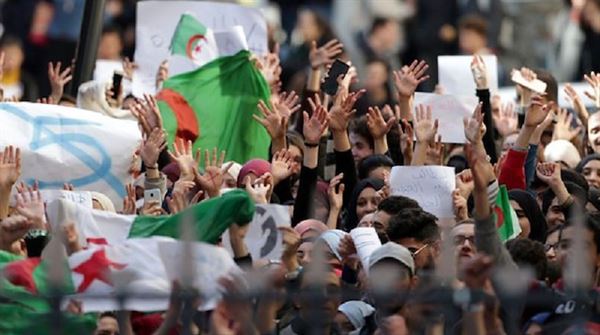Algeria is scheduled to go to presidential elections on Dec. 12 amid massive nationwide protests that have continued for nine months, rejecting the up
Algeria is scheduled to go to presidential elections on Dec. 12 amid massive nationwide protests that have continued for nine months, rejecting the upcoming elections under the current political structure.
The ongoing political crisis was triggered in February shortly after the ruling National Liberation Front (FLN) announced Abdelaziz Bouteflika’s candidature for a fifth term, which was later withdrawn in April.
Bouteflika, 82, has ruled the North African nation from 1999 to 2019. After losing military support and being under pressure from the street protests, his 20 years in power came to an end on April 2.
Following Bouteflika’s forced resignation, Algerian Army Chief of Staff Ahmed Gaid Saleh — who is believed to be the current de facto ruler by many — insisted on holding presidential election to end the crisis and avoid political impasses.
The upcoming election was scheduled for July 4 before being postponed by Algeria’s Constitutional Council.
The delay of the polls came after months-long arm wrestle between authorities and protesters. The demonstrators demand “yetnahaw gaa”, or they all must go, referring to the political and military elite overseeing the ongoing transition.
– Trust crisis
As vote approaches, protesters do not seem to be exhausted by the 9 months of protest movement.
“The protest will continue […] the candidates are the same people we used to see in Bouteflika’s regime […] they are insulting the intelligence of Algerians,” B. Mehdi, 28, a protester from northwestern Oran city, told Anadolu Agency.
Since April, Algerians have been expressing their distrust in Bouteflika’s men — including interim President Abdelkader Bensalah, Prime Minister Noureddine Bedoui and former head of the Constitutional Council Tayeb Belaiz, who resigned on April 16 following protests.
For Islam H., 20, who participated in the protests in northwestern Ghilizan city, the protest is not only about delaying the election or opposing the military, but also against the deep-state.
– Candidates
Five candidates are vying for the presidential office. Among them are two former Prime Ministers Abdelmajid Tebboune and Ali Benflis, former Culture Minister Azzedine Mihoubi, former Tourism Minister Abdelkader Bengrina, and Abdelaziz Belaid — who is known for supporting Bouteflika.
“The problem is that we will have a president manipulated by the shadow men, one of them is Gaid Saleh […] there will be a legitimate president, I mean legitimate for the system but illegitimate for the people,” Mehdi said.
“People chanted slogans against Benflis in Bouïra province […] Bengrina campaigned in my town, few people attended the meeting […] people don’t trust these candidates,” according to Islam.
Despite popular rejection of the Dec. 12 polls, some Algerians believe that the election is the only way to put an end to the crisis.
“Until July, I could understand the protesters’ demands. But after the announcement of the election date, it was no more a protest, it is an anarchy,” said Fatima. H., a 25-year-old resident of the capital Algiers.
The crackdown on the protesters — including the recent arrest of Abdelhamid Amin, a cartoonist critical of the army, on Nov. 12 — suggest that both the authorities and protesters are still holding firm to their positions.
Though protesters say that they will only rely on peaceful demonstrations to oppose the politico-military establishment, things might escalate following the election.
“More and more people will join the protests after the election, people who didn’t participate lately will be mobilized again […] but once we have a president, protesters will be oppressed and violence might increase,” Mehdi said.
